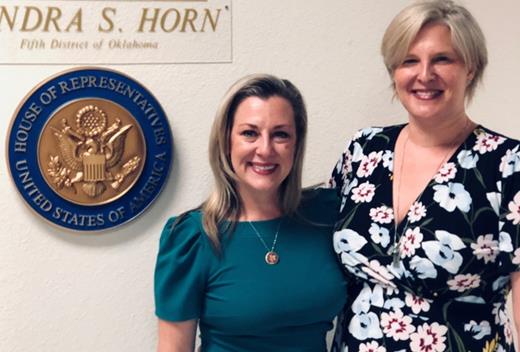Pictured (L-R): Jennifer Holter-Chakrabarty, MD, and Representative Kendra Horn
Pictured (L-R): Jennifer Holter-Chakrabarty, MD, and Representative Kendra Horn
To help drive change in Washington, you don’t always have to travel to Washington. Meeting with and building relationships with your senators and representative is a powerful way to advocate on behalf of hematology from your home state. Members of Congress have local district offices that they and their staffs regularly visit, and these can be fruitful venues to meet and build working relationships with your elected officials.
The Hematologist spoke with the Vice Chair of the ASH Committee on Government Affairs, Dr. Jennifer Holter-Chakrabarty, who met with members of her Oklahoma congressional delegation during the August congressional recess. As a member of the Committee on Government Affairs, Dr. Holter-Chakrabarty helps shape the Society’s legislative policy positions by reviewing issues of import to members, working on policy statements and evaluating the most effective ways to advocate for change within Congress and in state and federal agencies. Before joining the committee, Dr. Holter-Chakrabarty was an advocate for patient care who was known for being engaged in transplant- and hematologic malignancy–related advocacy efforts in her home state.
As an advocate, Dr. Holter-Chakrabarty has worked to speak out and build relationships with her legislators through a combination of letter writing, attending town halls, and scheduling in-person meetings. “It goes without saying that one should advocate often and with purpose,” said Dr. Holter-Chakrabarty.
With that spirit and sense of purpose, Dr. Holter-Chakrabarty arranged two important meetings to introduce herself and the field of hematology to a few members of the Oklahoma delegation. In her meeting with newly elected Representative Kendra Horn (OK-5), Dr. Holter-Chakrabarty discussed the work being done at the University of Oklahoma Health Science Center, focusing on her research in chimeric antigen receptor T-cell (CAR-T) treatment. In another meeting, she shared information about cutting-edge hematology research with Representative Tom Cole (OK-4), the ranking member of the House Labor, Health, and Human Services Appropriations Subcommittee. That particular meeting carried special significance because the subcommittee oversees and appropriates funding for the National Institutes of Health. Meeting in person “helped me clarify to my congressional representatives how national policy affects local change and more directly, my patients,” said Dr. Holter-Chakrabarty.
Honing your message and sharing personal stories and examples are key for being a successful advocate and having an effective meeting with your legislator. “When you advocate, you must be prepared with solid data, a clear message, and personal experiences that highlight the significance of what you are advocating for,” Dr. Holter-Chakrabarty explained. “On a personal level, meeting with my legislators allowed me to thank them for policies that had a major impact on continuing my research and improving the treatment outcomes of my patients. It was also an opportunity for me to clearly identify areas where further progress could be made and barriers to success could be addressed.”
When encouraging others to get involved, Dr. Holter-Chakrabarty emphasized that legislators are listening to the opinions of their constituents. Whether it is a tweet, a letter, or a phone call, “our voices, both individually and collectively, make a difference,” she said.
There are many ways to get involved in advocacy. “ASH members should stay connected with the grassroots networking events at the annual meeting, advocacy efforts on ASH’s website, or by social media to engage their congressional members … and stay apprised of health care-related issues that affect their patients. When possible, they should engage both state and federal congressional members at their local offices,” Dr. Holter-Chakrabarty stressed.
All ASH members can participate in the Society’s advocacy work by joining the ASH Grassroots Network to receive regular updates about the Society’s advocacy efforts and information about how to contact their members of Congress. Additionally, staff in the ASH Government Relations and Practice Department are available to help set up meetings with congressional staff in Washington, DC, or in a legislator’s state or district office. ASH staff can also provide the information needed to be an effective advocate, including fact sheets and relevant talking points. For more information, visit www.hematology.org/advocacywww.hematology.org/advocacy or contact ASH Senior Manager, Legislative Advocacy Tracy Roades at troades@hematology.org.
“Each person’s advocacy is personal,” said Dr. Holter-Chakrabarty, “but collectively, we can create important change.”

